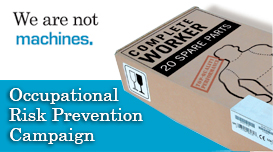Psychosocial Risks
3. Consequences of Psychosocial Risks
When work conditions and human factors are balanced, the job creates feelings of superiority and self-confidence, increases motivation, work capacity, job satisfaction and improves health.
However, the effects may vary if an imbalance is produced. As a result of job dissatisfaction, psychological effects may emerge, as well as behavioural reactions, psychophysiological consequences and even incidents and accidents at work. Let us recall that the set of aforementioned psychological effects, behavioural disorders and psychophysiological consequences constitute what is known as the state of stress.
3.1. Psychological consequences
The persistence of harmful psychosocial factors over time could lead to a decrease in the worker’s psychological defences, favouring the appearance of emotional disorders such as feelings of insecurity, fear, phobias, apathy, depression, etc. Moreover, these complaints may be accompanied by disorders in cognitive functions such as attention, memory, thinking, concentration, etc.
3.2. Behavioural reactions
Behavioural reactions affect personal and family life, as well as the social and work life of the worker, having repercussions in the efficacy of organisations. The International Labour Organisation (ILO) classifies behavioural disorders as:
- Active behaviour: complaints, strikes, confrontation with bosses and superiors, delays, etc.
- Passive behaviour: resignation, indifference as to the quality of the work done, absenteeism, lack of participation, not wishing to be with people, sensation of not coping, unhappiness, not being able to sleep well, food, alcohol or tobacco abuse, etc.
3.3. Psychophysiological consequences
A relation has been shown to exist between psychosocial factors and a series of functional physical disorders and borderline psychological states. The appearance of one or other disorder depends on the sensitivity of each person, as disorders of this kind may affect the weakest part of each individual.
These disorders may be cardiovascular in nature (heart attacks), respiratory (bronchial hyperactivity, asthma), disorders of the immune system (rheumatoid arthritis), gastrointestinal (dyspepsia, peptic ulcer, irritable colon syndrome, Crohn’s diseases, ulcerous colitis), dermatological (psoriasis, neurodermitis, allergies), endocrinological, musculoskeletal (back ache, contractures) and mental health disorders.
3.4. Incidents and accidents at work
Harmful psychosocial conditions may giver rise to distraction, unsafe conduct, etc., and result in incidents or accidents.




